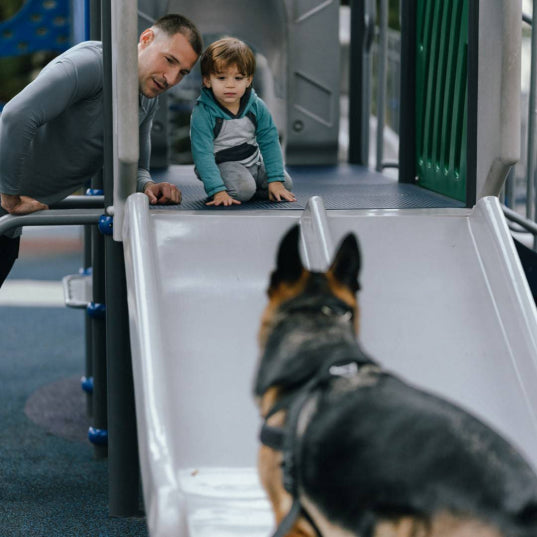The Department of Housing and Urban Development (HUD) defines an assistance animal as one that assists, performs tasks, or offers emotional support to alleviate the effects of a person's disability.
Guide to Living with an Emotional Support Animal
Welcome to your comprehensive guide to living with an Emotional Support Animal! As Emotional Support Animals and Psychiatric Service Animals differ, it's essential to know the different levels of legal protection they enjoy.
This guide will clarify the laws that safeguard emotional support animals. We’ll also explore the differences between ESAs and PSAs while explaining the qualifying process for each to find what suits your needs. Get ready to understand how your Emotional Support Animal can help you navigate the ins and outs of daily life so you can live your best life with your fantastic animal companion by your side.
Emotional Support Animals: A Source of Comfort and Assistance
The Americans with Disabilities Act (ADA), defines emotional support animals (ESAs) as companion animals that provide comfort, companionship, and emotional aid to individuals dealing with emotional or mental disabilities.
The remarkable impact of emotional support animals stems from their ability to offer unwavering affection, foster comfort, and help in alleviating symptoms of various mental health disorders.
Conditions like depression, anxiety, post-traumatic stress disorder and more can all be positively influenced by the presence of an emotional support animal.
Emotional support animals can perform a vital role in individuals grappling with essential life activities like sleep, chronic anxiety, or significant impairment due to diagnosed mental conditions.
While dogs are the most commonly recognized emotional support animals, any species can qualify as a legitimate ESA. The essential criterion is that the animal must demonstrate the capability to alleviate some aspect of the individual's mental and emotional struggles. So, whether it's a cat, horse, or any creature that forms a strong bond with an individual, it holds the potential to become their official emotional support animal.
As the ADA outlines, the process for acquiring an emotional support animal is similar to obtaining a regular pet. They can be adopted from shelters, purchased from reputable breeders, or obtained through standard methods.
By acknowledging the significance of emotional support animals, individuals can discover comfort and aid on their path to improved mental well-being. These animals provide a distinctive kind of support that goes beyond traditional therapeutic methods, showcasing the potent influence of the human-animal connection in fostering emotional healing and stability.
Remember, a licensed and practicing mental health professional must diagnose your condition to ensure the legitimacy of an ESA.

Enjoy the legal benefits of certifying for an emotional support animal with a Felicitails licensed therapist.
Click here to begin today!Understanding Emotional Support Animal Laws
Emotional support animal regulations play a crucial role in upholding the rights of individuals dealing with mental health conditions. Though these regulations may differ between states, they generally concentrate on housing arrangements, ensuring that emotional support animals (ESAs) aren't subjected to breed or size limitations.
ESAs, regardless of their species— dogs, cats, or others — are protected under a significant federal law: the Fair Housing Act (FHA). This covers an individual's right to have emotional support animals alongside them in their residence.
The FHA applies to almost all housing scenarios, shielding emotional support animal owners from restrictions and charges imposed by landlords and housing providers.
The Fair Housing Act and ESAs
In 1968 the Fair Housing Act became law. It was passed to stop unfair treatment when people buy or rent homes. It prohibits landlords and people who provide housing from discriminating against people with disabilities, including those with emotional support animals or service dogs.
Because of the FHA, housing providers can't treat people unfairly because of their disability, even if there are rules against having pets where they live. They must make reasonable adjustments to allow people with emotional support animals to live in their accommodation.
To access these protections, people need the proper documentation, such as an ESA letter for housing, written and signed by a licensed mental health professional.

Notably, the U.S. Department of Housing and Urban Development (HUD) clarifies that an assistance animal isn't the same as a pet. This means that housing providers can't treat people with emotional support animals unfairly and usually have to make reasonable adjustments to accommodate them.
The Rights of ESA Owners Under the Fair Housing Act
Emotional support animal owners have several rights under the Fair Housing Act. These rights include:
- The right to have their emotional support animal(s) live with them in their home, even if the accommodation has rules prohibiting pets.
- Freedom from restrictions on animal weight or breed that housing providers place usually impose on pets.
- Freedom from extra fees such as added rent or cleaning deposits related to pets.
These adjustments are required in most housing situations, whether individuals buy or rent accommodation. In short, a landlord can't turn someone away just because they have a support animal.
These safeguards also apply to people with guide dogs, signal dogs, psychiatric service dogs, or other support animals. However, there might be a few cases where exceptions apply based on specific situations.
Housing Situations Excluded Under the Fair Housing Act
The Fair Housing Act covers many different kinds of housing. However, there are certain situations when it doesn't apply:
- Buildings with four or fewer units where the owner lives in one of the units.
- Housing run by religious groups and private clubs that only let their own members live there.
- Houses that are sold or rented directly by the owner, not through an agent.
Apart from these exemptions, the FHA applies to all other types of housing.
In certain exceptional situations, a housing provider might be able to reject an ESA if they can show that it would be too expensive, create too much work, put other people's health and safety in danger, or cause extensive damage to the property.
ESAs and Rights to Common Area Access
According to the HUD guidelines for emotional support animals, a reasonable accommodation by a landlord is a “change, exception, or adjustment to a rule, policy, practice, or service that may be necessary for a person with a disability to have equal opportunity to use and enjoy a dwelling, including public and common use spaces.”
Note that “public and common use spaces” are specifically called out. That means an ESA owner is entitled to take their emotional support animal through the lobby, elevator, stairways, and any other common areas that other residents can access.
State-Specific ESA Housing Laws
While the Fair Housing Act is a federal law that applies nationwide, several states have additional laws that govern emotional support animals. These state laws do not contradict the FHA but add specific requirements for ESA owners, offering even more robust protection for emotional support animals. Here are some examples:

California residents must establish a client-provider relationship with a mental health professional for at least 30 days before obtaining an ESA letter. Under state law, ESAs are allowed in most workplaces with more than five employees, as long as the animals are appropriately trained and do not threaten health or safety.

Florida has passed a state law that aligns with FHA housing protections for ESA owners. It also criminalizes fraudulent ESA requests, emphasizing the importance of complying with federal and state legitimacy requirements for ESA letters.

The Texas Fair Housing Act grants rights to ESA owners similar to those provided by the federal FHA. In Texas, landlords and housing providers can only request proof of disability when it is not apparent, and an ESA letter signed by a licensed mental health professional serves as acceptable proof.

New York permits housing providers to request proof of vaccination for ESAs per state laws. ESA owners in New York enjoy rights equivalent to those outlined in the FHA. However, according to the New York Public Health Code, some emotional support animals may be prohibited in the City of New York. Landlords cannot charge additional fees for ESAs but may hold tenants responsible for property damage or excessive wear and tear caused by the animals.
Other states may have ESA-specific laws concerning accommodation, university student housing, or short-term rentals.
As society’s understanding of mental and emotional disabilities grows, we may witness future changes to state laws that further protect the rights of emotional support animal owners.
By familiarizing yourself with ESA laws, you can better advocate for your rights and ensure that you and your emotional support animal receive the necessary accommodations and support.
If you’re considering obtaining an ESA, consult the specific laws in your state and seek guidance from licensed mental health professionals to navigate the process effectively.
University Accommodation and Emotional Support Animals
Colleges and campus housing must make arrangements for students who want to have their emotional support animals living with them. Some colleges have faced consequences for not following the Fair Housing rules.
However, universities might have unique regulations related to emotional support animals and claim exceptions under the FHA. To know more, it's advisable to contact your school to discuss their specific policies about having emotional support animals in dorms and campus housing. It may also help if you can provide a therapist-certified ESA letter which confirms your need for a ESA to help you navigate everyday life.
Hotels, Airbnb, and short-term rentals with Emotional Support Animals
Hotels are not included in the ESA Fair Housing rules, so they aren't obliged to let emotional support animals stay. This applies to Airbnb-style short-term lets too. They don't have to allow emotional support animals, but you can ask in advance if this could be possible for you. Some hosts might agree to accept a well-behaved emotional support animal, especially if you can provide a valid ESA letter for Housing. Still, it's wise to check with them before you book your stay and avoid problems or additional charges later.
Access to Restaurants and Stores with an Emotional Support Animal
Unlike psychiatric service dogs, emotional support animals do not have special public access privileges. They are not permitted in stores, restaurants, or other businesses that do not accept pets.
Each business has the discretion to decide whether to allow emotional support animals, and they may choose to accept or decline them. While some businesses might choose to accommodate emotional support animals as a courtesy, they also have the right to refuse such accommodations.
If you’re planning to visit a restaurant or store with your ESA, it’s wise to check in advance whether they will accept your ESA, and perhaps share your therapist-certified ESA letter to help explain your need.
Using Uber or Lyft with an Emotional Support Animal
Uber has no specific policy in respect of ESA’s, so it seems to be at the discretion of the driver whether they accept your furry companion. It’s the same with Lyft. Passengers may sometimes ask to bring their emotional support animal along for their ride, but these are considered as pets, so it's up to the driver to allow the passenger's pet into their car. To avoid hassle and possible additional charges, it’s important to explain the situation when booking your ride.
The situation is different if you have a PSA. State and federal laws universally prohibit transportation providers from refusing service to passengers due to their Psychiatric Service Animal and from any form of discrimination against passengers accompanied by service animals.
The Air Carrier Access Act and Emotional Support Animals
If you're planning to travel by air with an emotional support animal (ESA), you need to be aware of how the Air Carrier Access Act (ACAA) impacts your rights and accommodations.
The ACAA is a federal law prohibiting discrimination against individuals with disabilities by airlines and other air travel providers. While the ACAA previously offered specific protections for emotional support animals, recent changes have altered its provisions. Let's clarify what these important changes mean for ESA owners.
The Evolution of the ACAA and Emotional Support Animals
Previously, the ACAA required airlines to allow individuals with mental or emotional disabilities to bring their emotional support animals in the cabin without imposing ‘pet fees’ or other additional costs. However, in early 2021, the law underwent an amendment that now excludes emotional support animals from the list of protected animals under the ACAA. For full details, read the final ruling here.
Current Rights and Accommodations for Emotional Support Animal Owners
Since January 2021, the ACAA has not guaranteed special rights for ESA owners. Airlines now have the discretion to classify ESAs as pets instead of service animals.
Consequently, most US air carriers now exclude emotional support animals from the cabin and charge additional fees for their transportation, whether in the cabin or the cargo area.
However, policies can change, so it's worth researching airlines to find out if they offer the option to travel with an emotional support animal in the cabin, either for free or for an additional payment.
In cases where an airline does not provide such a program, ESA owners may need to transport their animals in the cargo hold, following the airline's pet transportation guidelines and paying any applicable fees.
If you travel frequently with an emotional support dog, it may be worth exploring whether they meet the criteria to be classified as a psychiatric service animal, as PSAs are fully protected under the ACAA.
Exceptions and Service Animals
It's important to note that the ACAA does not include specific protections for ESA owners.
The law still requires airlines to accommodate individuals with psychiatric service animals, but an emotional support animal is not given any special rights.
Service animals are defined as dogs of any breed or type trained to perform specific tasks to support individuals with disabilities.
This definition aligns with the Americans with Disabilities Act and includes guide dogs and specially trained psychiatric service dogs. It excludes emotional support animals.
Understanding your rights and the limitations of the current ACAA regulations is crucial when traveling with an emotional support animal. By staying informed and communicating with your airline, you can navigate the process and ensure a comfortable and hassle-free journey for you and your ESA.
The Differences Between Emotional Support Animals and Psychiatric Service Dogs

An Emotional Support Animal (ESA) is a companion animal that provides therapeutic support to individuals with mental or emotional disabilities.

A Psychiatric Service Animal (PSA) is a specially trained animal that performs specific tasks to assist individuals with psychiatric disabilities and conditions.
Emotional support animals (ESAs) and psychiatric service animals (PSAs) serve different purposes. Understanding the distinction will help you make informed decisions when certifying an animal in a way that best suits your needs.
Here are the differences between ESAs and psychiatric service animals:
Resources are available to assist you if you choose to self-train your pet or ESA as a psychiatric service dog. At the Free My Paws Training Academy, through Felicitails, we offer an online PSD training program specially designed to prepare you for training your dog. To get started, you can take our brief online quiz to assess your needs and determine whether a PSD suits your needs and would support you in everyday life.
PSA Rights Under the ADA
Psychiatric service dogs are often mistaken for emotional support animals, but they are distinct in their purpose and training.
Psychiatric service dogs perform tasks that aid individuals with mental or emotional illnesses. These remarkable canines undergo specialized training and are granted special rights and protections under the Americans with Disabilities Act (ADA).
Understanding the ADA
In 1990, the Americans with Disabilities Act was passed into law to safeguard the rights of individuals with disabilities and combat discrimination. It covers various topics, including service animals and their legal rights and protections.
According to the ADA, a service animal is a dog trained to perform tasks directly related to an individual's disability. There are no restrictions on the size or breed of service animals – any dog with the appropriate training can fulfill this role.
Interestingly, the government does not mandate certification or registration in a database for service dogs. Nor are they required to wear identifying items like vests or ID tags, although owners may choose to use them.
The ADA clarifies that emotional support animals are NOT considered service animals.
This is because emotional support or comfort alone does not constitute a task related to a person's disability. However, a dog trained to recognize and react to their owner's panic attacks would qualify as a service animal.
Tasks Performed by Psychiatric Service Dogs
Psychiatric service dogs (PSDs) are trained to assist individuals with psychiatric disabilities such as PTSD, depression, or generalized anxiety disorder. Tasks performed by psychiatric service dogs include:
The training a psychiatric service dog receives is tailored to the unique needs of the individual with a mental or emotional disability. The defining aspect of a psychiatric service dog is that the tasks they are trained to perform directly relate to the individual's condition.
Rights Granted to Psychiatric Service Dog Owners
The ADA grants several essential rights to individuals with disabilities and their service animals, including psychiatric service dogs. In most cases, service dogs must be accommodated in various settings, even those that typically do not allow pets. Here are some areas where PSDs must be allowed to accompany their owners:
Now that we’ve looked at the legal rights of ESAs and PSAs, let’s consider the specific benefits of each one to help you make an informed decision when it comes to certifying your pet.
The Transformative Power of Emotional Support Animals
When it comes to individuals with mental or emotional disabilities, mental health professionals have observed remarkable improvements thanks to the presence of an emotional support animal. Let's delve into the myriad of benefits that these animals provide.
The Power of Psychiatric Service Animals, Typically Dogs, in Enhancing Mental Well-being
Psychiatric service dogs (PSDs) are trained to assist individuals with psychiatric disabilities such as PTSD, depression, or generalized anxiety disorder. Tasks performed by psychiatric service dogs include:
How to Qualify an ESA or PSA/PSD
If you're now asking yourself whether your beloved companion could qualify as an emotional support animal (ESA) or a psychiatric service animal/dog (PSA/PSD), it's essential to understand the eligibility requirements for differing levels of legal protection for your animal that we've listed above.
ESA Eligibility Requirements
To officially designate your pet as an ESA, you must have a diagnosis of a mental or emotional disability. An ESA can be a dog, cat, rabbit, or other animal.
Additionally, a licensed mental health professional (LMHP) authorized to practice in your state must prescribe an ESA as part of your treatment. The legally-recognized document validating your animal's ESA status is an ESA Letter. This letter should specify your diagnosed condition(s), a recommendation for an ESA, and the practitioner's license number.
PSA/PSD Eligibility Requirements
Psychiatric service dogs are classified as service animals, which grants them more extensive legal rights than emotional support animals. To become a psychiatric service dog, an animal must meet the following requirements:
Type of Animal
- A PSA must be a dog or (in some cases) a miniature horse. The vast majority are dogs, because they can be trained to perform a wide array of tasks, and can access most locations easily. No other animals are eligible.
Trained Tasks
- The dog must be able to perform tasks that benefit an individual with a mental, sensory, intellectual, or psychiatric disability. PSDs can assist with various mental disorders, including PTSD, panic attacks, anxiety, obsessive-compulsive disorder, depression and more.
- The specific tasks a PSD performs will depend on the individual's needs. They can include medication reminders, applying calming pressure, or warning of an impending panic attack, among other tasks.
- Unlike an ESA, a PSD requires specialized training which typically goes beyond basic obedience and focuses on exposure to different environments and situations to ensure the dog can handle them safely and appropriately.
- While professional training is not mandatory, some individuals train their PSDs, perhaps with online support, while others hire expert trainers.
- Like an ESA, a PSA requires a letter to establish its status as a service animal. The process is akin to obtaining an ESA Letter.
- First, you must receive a diagnosis of a qualifying condition that would benefit from the support a PSA can provide.
- You will also need to demonstrate that the dog is able to perform specific tasks to support you. This can be done in person, or via a video assessment.
- A licensed mental health professional can then write and sign PSA Letters for you.
How To Get Your ESA or PSA Travel & Housing Letters
If you have an emotional or mental disability and believe your pet qualifies as an emotional support animal or a psychiatric service animal, obtaining official therapist certified letters are essential to ensure you receive the legal protections you deserve.
You can obtain an official Free My Paws ESA or PSA package, including your Housing and Travel letters online through Felicitails, typically within 24 hours.
Note: Although most U.S. airlines no longer accept ESAs, your Free My Paws ESA letter for Travel may be helpful when reserving hotel, or Airbnb/short-term accommodation, or accessing other public spaces. However, as ESAs do not fall under the umbrella of the ADA, this will be at the complete discretion of the establishment and in accordance with their policies.
Our Free My Paws service is a specialized telehealth program that caters to qualified individuals by providing ESA Letters and PSA Letters. Getting your Free My Paws Certification through Felicitails couldn’t be easier!
- Purchase the program that best suits your needs.
- Complete your patient profile by completing our comprehensive and secure questionnaire.
- Electronically sign and submit the questionnaire when complete.
- When contacted by our in-house licensed therapists, confirm a date for a telehealth appointment.
- Confirm the answers to your questionnaire with our licensed therapist. During this process, you'll discuss your mental and emotional condition and symptoms, allowing the therapist to diagnose your condition and prescribe the correct treatment to include either an ESA or PSA for your needs.
- If the therapist recommends an ESA or PSA, they will write the appropriate letter and provide you with a digital copy, typically within minutes after your telehealth appointment.
Our Free My Paws certification program, through Felicitails, ensures that your letters are legitimate and comply with the latest state and federal regulations. In the event of any changes, your letters will be automatically updated, free-of-charge.
Additionally, our expert team members will advise you and address any concerns or questions your landlord may have regarding your letter during your rental application process.
Summary
If you experience a mental or emotional disability, an ESA or PSA can significantly enhance your daily life.
Fortunately, federal service animal laws grant specific rights to these exceptional animals and their owners. The Fair Housing Act (FHA) ensures housing protections for emotional support animals. The Air Carrier Access Act (ACAA) and Americans with Disabilities Act (ADA) allow psychiatric service dogs to accompany their owners in most locations.
In this article, we’ve explained in detail the differences between an ESA and a PSD to help you understand the legal protections each one enjoys.
If you have an animal that helps you cope with a mental or emotional condition, obtaining an official letter provides the proof you’ll need to access these legal protections.
The Felicitails Free My Paws Therapist Certification process has been perfected over the past decade to ensure our patients are 100% satisfied. We pride ourselves on providing a straightforward and hassle-free process for qualified individuals to obtain the required documentation in order to enjoy the benefits of living with an emotional support animal or a psychiatric service animal.










